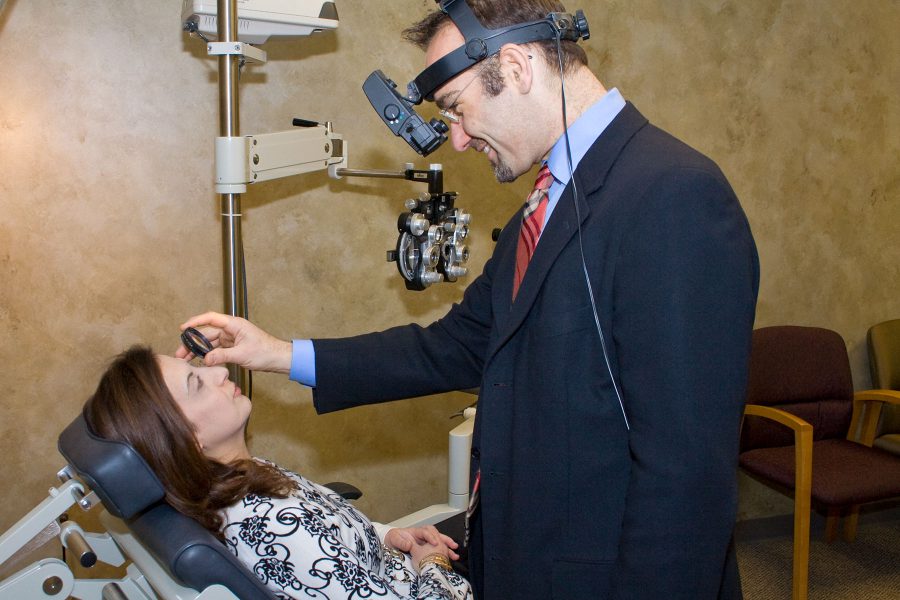Eye Exams
According to the American Academy of Ophthalmology, regular eye exams help maintain overall health and identify eye problems early. Treating eye diseases sooner helps preserve vision as long as possible. At Cohlmia Eye Center in Wichita, we provide comprehensive eye exams to diagnose diseases and other conditions of the eye.
When Should You Get An Eye Exam?
Children
Children should receive vision screenings at regular intervals from birth all the way through their teen years. This usually happens during well-child visits with their pediatrician or family physician and at school. If eye problems are detected, a baby or child will be referred to an ophthalmologist to receive a comprehensive eye exam. However, an ophthalmologist can perform a vision screening and/or eye exam at any time.
All children should have their first comprehensive eye examination before they enter school. Nearly 25 percent of school-aged youth have undetected and/or untreated vision problems that can interfere with learning. Eye alignment and visual acuity, or the level of vision sharpness, should be tested beginning at age 5 and annually through the teen years, because our eyes and vision change as we grow.
Adults
An adult with healthy eyes, good vision and no underlying health conditions should schedule a comprehensive eye exam with an ophthalmologist every few years. The American Academy of Ophthalmology recommends one complete eye exam during your 20s, two in your 30s and another at age 40. Eye diseases become more common with age, so seniors who are 65 and older should see an ophthalmologist every 1-2 years.
Adults with high blood pressure, diabetes or a family history of eye diseases should have a comprehensive eye exam before age 40. Your ophthalmologist can help you determine your future exam schedule. Any eye injuries or changes in vision should be evaluated by an eye care professional as soon as possible. Additionally, if you wear contacts, you’ll need to visit your eye specialist each year.
What Does an Ophthalmologist Check During an Eye Exam?
Dr. Cohlmia will perform a comprehensive eye exam to evaluate your eyes’ internal and external health. This will include more testing and screening than the routine eye exam performed by an optometrist, because a comprehensive eye exam is used to diagnose diseases of the eye. Your exam will include:
Medical history
This includes the medical history of you and your family, any medications you’re currently taking, and whether or not you wear corrective lenses.
Visual acuity
This is the test with an eye chart to determine whether you have 20/20 vision or correction is needed. If you wear corrective lenses such as glasses or contacts, your ophthalmologist will also check your prescription to ensure it’s still accurate for you.
Pupils
A beam of light will be shined back & forth across your eyes to see how your pupils respond
Side vision
Peripheral vision loss can be a sign of glaucoma, and it’s often not noticeable in our daily activities.
Eye movement
Your eye motility will be evaluated to ensure your eyes are properly aligned and that the muscles work to move the eyes correctly.
Eye pressure
A tonometry test usually involves a brief puff of air onto your eye to measure the intraocular eye pressure (IOP). You may be given numbing eye drops prior to this test for added comfort.
Front of the eye
Your eye will be evaluated through a slit-lamp microscope that lights up the front of the eye, including the cornea, lens, iris and even the eyelids. This test allows your ophthalmologist to see any scratches or scars on your cornea and to check for cataracts.
Retina & optic nerve
Eye drops will be administered to dilate, or widen, your pupils. Then, Dr. Cohlmia will check the optic nerve and retina in each of your eyes to look for signs of disease or damage. Dilation can make your eyes sensitive to light for a few hours after the exam.
Additional Tests
Dr. Cohlmia may recommend additional tests and imaging to more thoroughly examine the back of the eye, inside the eye or on its surface. These tests help provide early diagnosis of eye diseases:
- Fundus photos
- Optical coherence tomography (OCT)
- Fluorescein angiography (FA)
- Automated visual field
- Topography (scanning the cornea’s surface)
After your comprehensive eye exam, Dr. Cohlmia will explain his findings and recommend a follow-up schedule. If an abnormality is detected, he will discuss treatment options.
Schedule An Exam Today
If you live in the Wichita area, contact Cohlmia Eye Center online or at 316-264-8932 to make an appointment for a comprehensive eye exam. If you would like us to remind you about your future appointments, just let us know.

